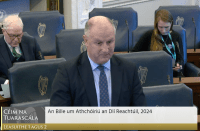Midlands-North-West MEP Ciaran Mullooly has raised significant concerns with the President of France about the potential deployment of Irish Defence Force personnel as part of a United Nations (UN) peacekeeping mission in Ukraine.
Speaking at Ireland’s Voice in Europe: In Conversation with Midlands-North-West MEPs, held last night at The Hardiman Hotel in Galway, Mullooly revealed that he had directly questioned French President Emmanuel Macron during a recent meeting about the strategic considerations for such missions and their implications for Irish neutrality.
Mullooly expressed serious concern over any ceasefire deal that might emerge from the proposed US – Russia negotiations, its impact on the people of Ukraine and asked President Macron to clarify any envisioned role of Irish troops in a potential peacekeeping operation, particularly in light of Ireland’s neutrality and its historical approach to international missions. While President Trump and President Macron later provided detailed insights into broader international peacekeeping strategies, Mullooly emphasised that his own conclusions were formed after further consultation with Cathal Berry TD, a former Army Ranger and military expert.
“After speaking directly with President Macron and consulting with Cathal Berry, I have formed a clear position: Irish troops must not be deployed to border regions or other danger zones in Ukraine. Our troops, if deployed towards peacekeeping efforts, will likely be placed inland and away from the borders but they must have proper equipment, resources, and supports to defend themselves if enforcing a UN peacekeeping mandate,” Mullooly stated.
Mullooly also expressed major concerns about the possibility of an EU defence force requesting Irish troops for such roles. “Ireland’s neutrality has served us well for many years, and any move towards an EU defence force raises serious questions about our sovereignty and our ability to make independent decisions regarding the deployment of our Defence Forces,” he said.
The MEP stressed that further debate is required on this issue, particularly given Ireland’s position as a neutral country. “We need an open and honest discussion on the future of the United Nations structures and about how Ireland can continue to contribute to global peacekeeping efforts while safeguarding our neutrality and ensuring that any involvement is consistent with our values,” he added.
Mullooly outlined what he believes to be the most likely scenario if a truce is reached in Ukraine: contested “occupied territories” would require an international peacekeeping presence, with Anglo-French forces likely taking the lead and Irish troops potentially being asked to play a supporting role under a UN mandate.
“Ireland has always played a constructive role in international peacekeeping efforts,” Mullooly said. “But we must ensure that our soldiers are protected, properly resourced, and deployed only in specific inland locations and if this scenario does play out we should not be rushing in as immediate boots on the ground. I am particularly pleased to hear from President Trump that the US are prepared to act as a backstop in a case where our troops might be under attack but I sincerely hope it doesn’t come to that – for the sake of defence force members from barracks in Dundalk, Athlone, Galway , the Curragh camp and Finner camp who may well be asked to join the UN peacekeeping mission.
“We live in dangerous times “ MEP Mullooly said , “but we must go into these situations with our eyes open and I believe our own government will face crucial decisions in this regard as soon as March 5th so they must be prepared.”
The Galway event featured MEPs Maria Walsh (Fine Gael), Barry Cowen (Fianna Fáil), and Ciaran Mullooly (Independent Ireland) alongside Brendan Flynn, Lecturer and Head of Politics at the University of Galway, as well as Dr Orla Flynn, President of Atlantic Technological University, who moderated the discussion. Organised by the Institute for International & European Affairs (IIEA) in partnership with the European Parliament Liaison Office in Dublin, the event provided constituents with an opportunity to engage directly with their representatives on issues including agriculture, climate change, housing, transport, and international security.
Reflecting on the event, Mullooly remarked: “It was an evening of tough questions and honest answers. I am committed to ensuring that Ireland continues to play a constructive role internationally while safeguarding our neutrality and protecting the lives of our Defence Forces personnel.”






